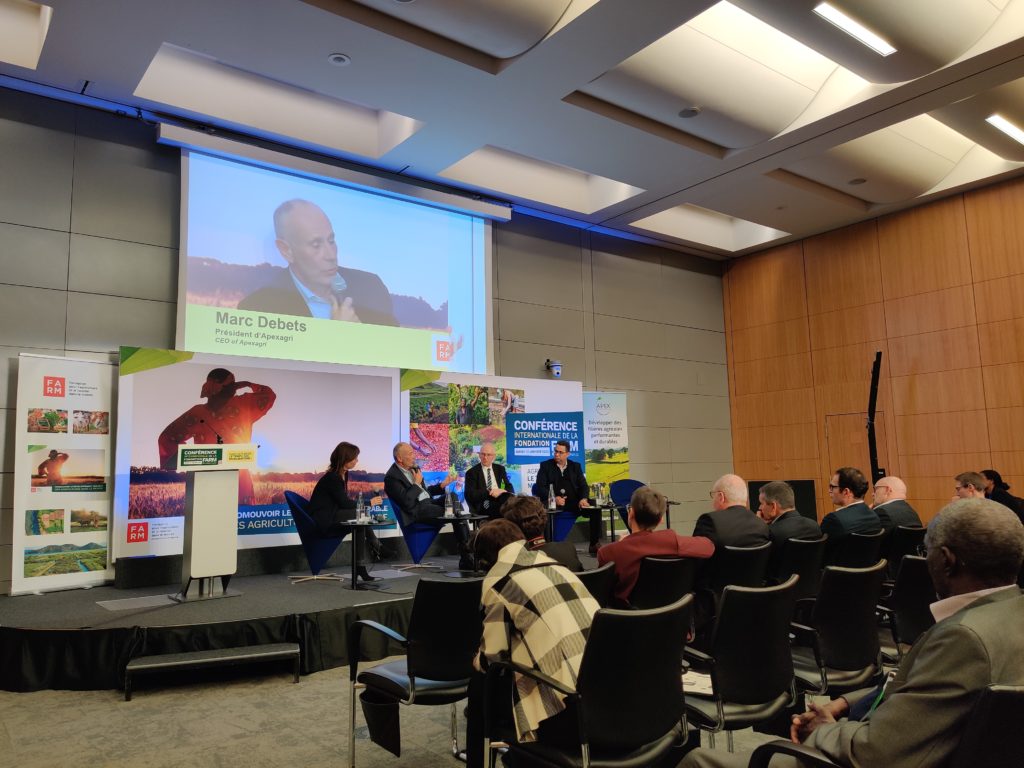On January 17, was held the FARM Conference, in the premises of the OECD in Paris. Apexagri supported the organization of this event from the FARM Foundation, alongside the Ministry of Agriculture and Sovereignty, the Ministry of Europe and Foreign Affairs, and the media EURACTIV France. More than 200 participants were gathered on site. There were also more than 400 remote participants for this hybrid FARM Conference.
FARM Conference: bringing together and mobilizing all stakeholders in agricultural development
The aim of this FARM conference was to bring together “all the actors who wish to make their contributions to the essential transformation of agriculture and food systems“. Farmers, researchers, politicians, funders, students, citizens…
The introduction of this day was made by:
- Pascal LHEUREUX, President of the FARM Foundation
- Marc FESNEAU, French Minister of Agriculture & Food Sovereignty
- Kako NUBUKPO, Commissioner for Agriculture of the WAEMU
Four key sequences punctuated the FARM Conference around round tables: Questioning, Intensifying, Undertaking, Mobilizing. These round tables brought together actors from all continents, both face-to-face and remotely.
Gerda VERBURG, Under-Secretary General of the United Nations and coordinator of the Scaling Up Nutrition movement, first gave an introductory lecture. She welcomed the collective awareness of the issue of food sovereignty in the world, and reminded us how committed we all must be.
Participation of Apexagri in the round table on the use of technologies in agricultural entrepreneurship
During this FARM Conference, our president Marc Debets spoke alongside Christian HUYGHE, Scientific Director for Agriculture at INRAE. This round table focused on the use of technology in agricultural entrepreneurship.

Our president Marc Debets spoke at the FARM Conference
This round table was based on concrete testimonies of entrepreneurial initiatives in Africa and South East Asia:
- Youth Engagement in Agriculture Network (YEAN) in Rwanda, which shares information and techniques with a network of young farmers to promote access to innovation.
- Bioliva in Tunisia, an olive crusher that uses blockchain and a virtual marketplace to gain in tracability and add value to its production
- Agrabah Marketplace in the Philippines, which connects farmers and aquaculturists with consumers through its digital platforms
These are enlightening examples that have made it possible to highlight some essential points. First, these initiatives and small agricultural enterprises play a role in the structuring and economic dynamization of agri-food chains. They also have a major social impact through the jobs they create. As well as the pride they give to young people who succeed.
Then, it is necessary to remember that on a regional scale, public-private partnerships (PPPs) play a key role. Indeed, they help structuring agri-food chains, and financing industrial projects and infrastructure.
Finally, digital technologies are a very important in providing information, data and knowledge. As well as facilitating the connection between producers and consumers. But beyond digital technology, agriculture needs all the technologies (genetics, tillage, etc.) to support the agricultural transition and climate adaptation.